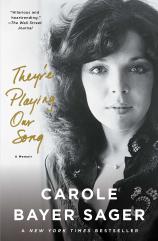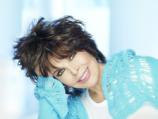Excerpt
Excerpt
They're Playing Our Song: A Memoir

Chapter One
More than once it’s crossed my mind that if my mother had been just the tiniest bit more nurturing, if she’d have looked at me a little less critically, maybe I would have felt like enough. But then I would never have had the intense need to be seen and heard, and I wouldn’t have had the life I’m about to share with you.
My mother, Anita Bayer, was pretty much afraid of everything, from flying on an airplane to being raped in her apartment to the idea that my father might love me more than her. When I was two months old she was giving me a bath when I slid out of her hands like a bar of soap and slipped underwater. Instead of immediately lifting me out, she panicked and raced out of the bathroom, leaving me alone and submerged.
“Help! The baby’s drowning!” she screamed to her oldest friend, Sally Held, who, thank God was visiting. She rushed in and pulled me out of the tub. As Sally later told the story – and believe me, she told it often – it was she who calmed me down and laid me in my bassinet, at which point my mother put her face really, really close to mine, kissed me on my forehead, branding me with her bright red lipstick imprint, and said, “Never scare me like that again!”
Music played all the time in our Manhattan West Side apartment. My father, Eli Bayer, favored classical music and could pick out any song on our piano with one ear – with one finger. My mother loved all the great divas. Her favorite, Judy Garland, blasted daily through our walls. We had records of all the top musicals and I grew up knowing the lyrics and melodies from every show by heart.
.
Addie, who took care of me while my parents were at work, taught me to say my prayers every night. We would both get on our knees, clasp our hands in front of us, and, despite the fact that I was Jewish, recite the Christian Child’s Prayer: “Now I lay me down to sleep, I pray the Lord my soul to keep. If I should die before I wake ….”
If I should die before I wake?Who thought to put that idea into a kid’s head? Now each night I had to worry about not waking up. The fear of death, so intuitively instilled in me in that bath, took an even stronger hold. Falling asleep was very high on my list of Things That Were Unsafe.
Oh, and my dad went to prison. Always the good guy, he helped his older brother by bribing an army officer friend to keep his nephew out of World War II. When I was two he spent six months in jail. Of course I have no cognitive recollection of what his sudden disappearance from my life felt like, but I didn’t have to remember the feeling. It remembered me. It especially remembered me at bedtime when the panic would engulf me.
People used to say I was the image of my father. When I was a baby they said, “Put a cigar in her mouth and she’ll look just like Eli.” All I saw was that I had his hazel eyes and we both tanned easily, unlike Mom, whose skin burned in the sun. And my dad always carried some extra weight, so that’s tendency I may have gotten from him.
Anita Nathan was five foot two and with a more than ample bosom. She happily passed to me her diminutive stature but withheld her big boobies. As an assistant dress buyer in the garment district she managed, with little money, to cut a fashionable figure. She loved when her more sophisticated friend Sally let her tag along to her uptown parties, where one night she met Eli Bayer, twenty-two years her senior. They began going out and when he got her pregnant he did “the right thing” and married her. Anita would have definitely been happier if I hadn’t come along so fast, but then, without me the deal would never have been sealed. She was still a child herself who wanted my dad’s complete attention, so I grew up feeling her resentment of his deep love for me. In truth, she would have preferred that I wasn’t there.
And then there was the real world outside of Apartment 10-A, with all of its dangers. For one thing, there was polio. Millions of kids worried about catching it, but I was certain that I already had it. I lay in bed at night imagining myself becoming paralyzed. In an attempt to allay my fears, my mother had bought me a walkie-talkie so I wouldn’t feel so afraid.
I buzzed. “Mommy, are you there?”
The walkie-talkie crackled. “It depends who’s calling.”
I knew this was her being funny, but this was no laughing matter. “It’s me. Carol.
I’m scared.”
“Polio again, I’m guessing?”
I heard my mother get up from her comfy bed and dutifully come into my bedroom. She took my plump leg and bent it backward and then forward. She did the same with the other one.
“See! They both bend. If you had polio, sweetheart, they would not bend. Now, get up and walk around.” I walked once around my small room.
“If you were paralyzed you would not be able to walk. You’re fine.” She gave me a kiss on the cheek and left. Unfortunately her reassurances only lasted until she was out of sight. I counted backwards from a hundred, and then, still awake, I got up and hurried into their room.
“I’m still scared,” I announced.
“Eli,” my mother said, “tell me what’s wrong with her. Why can’t she just go to sleep like a normal child?” How could I tell them I didn’t feel normal?
Some nights I got lucky and they let me sleep in between them. As I got a little older and it became less appropriate, I would tiptoe back into their room after Mom was asleep. I’d tap my father and he’d get out of bed, point for me to sleep on his side, and shuffle off to sleep in my room. I’d pull his blankets way over my head so if Mom woke up she’d think I was him. In the morning he would wake me up and I’d quickly run back to my room, trying to shake off the humiliation from my bizarre nighttime ritual. I would go off to school showing no signs of the crazy drama each night held. I was one of the popular kids. Happy by day, none of my friends had any idea of the other Carol.
When Jonas Salk came up with the polio vaccine, I escalated seamlessly to fearing leukemia, which was not only incurable but harder to diagnose. I always had black and blue marks – what kid didn’t? – but it was a symptom, and I thought I had lymph nodes sticking out in my neck. How many eight-year-olds knew the words “lymph nodes”? Yeah, I was a piece of work.
And then, of course, there was the bomb. Like millions of other pre-baby-boomers, I spent most of my early school years worried about Russia wiping us out. This fear established itself in grade school, when air raid drills were a part of the fabric of the fifties. On no notice, sirens would blare and we were sent scrambling under our little wooden desks with their attached seats, the protective qualities of which I always questioned. Plus, with my extra pounds, it wasn’t such an easy fit.
And the bombs didn’t only have to come out of the sky. This was the era of the tabloid-dubbed “Mad Bomber,” George Metesky, who for sixteen years cut holes in movie theater seats and left explosives in them, turning the normally pleasurable experience of movie-going into, for me, yet another exercise in terror. Many a subplot was lost on me as my eyes scanned each row in search of crazies with paper bags.
My weight was only perfect once in my life, when I was six pounds seven ounces at the age of a minute. I was always either putting on pounds or on a diet. I loved food, but eating it—at least the foods I desired (carbs, and more carbs—had terrible consequences. While I was definitely plump, I was never obese, though if you believed my mother I was always just a doughnut away. On the other hand, my father would say, “Don’t worry, Anita, she’s beautiful. She’ll lose the baby fat.”
So shopping for clothes, as you can imagine, was a nightmare. One afternoon, walking down the street, completely out of nowhere, my mother said, “Walk behind me, fatty. You’re embarrassing me.” That hurt. It felt awful. It still does. I understood even then that my mother only saw me as a reflection of her own narcissism. I didn’t know the word yet, but I knew how sad it made me feel. I was afraid to feel the anger so I stuffed it down with more food.
After failing to find a birthday dress to fit me at Macy’s, off we went to the plus-size store. “Welcome to Lane Bryant,” the slim hostess said, as she held out a silver tray of
big freshly-baked chocolate chip cookies. “Would you like one?” she asked. As my hand leapt to grab one, my mother just as swiftly pushed the woman and her tray away from me.
“They should be ashamed of themselves!” she said emphatically to no one in particular. “What a racket! God forbid they should lose their chubbies.” We never went back there again, though we did buy one ugly pink party dress (think plus-size and that’s a lot of pink coming at you) that I would wear at family occasions where my mother and her sister Lucille – whose daughter, my cousin Joan, was also a “fatty” – would commiserate, eyeing us and shaking their heads as if to say, “I can’t believe this happened to both of us.”
One night after dinner, my father began to have chest pain. Really bad pain.
"Dr. King is on the way,” my mother announced, hanging up the phone. “I have to run down to the drugstore and get Daddy some medicine. You wait up here with him." Before I could suggest that maybe I should go down to the drugstore she was out the door and I, a scared ten-year-old, was left to stay with my seriously ill father.
The pain was so great he could hardly breathe. I hoped that my interrupting his sleep every night hadn’t caused him to take ill. "Please, Daddy, don't die,” I prayed silently. It became a mantra. He was pretending to be calm but I could see he was as scared as I was. I could barely breathe as I watched him turning blue. Please, Daddy, don't die. Please, Mommy, come back with the medicine. And, through it all, the most terrifying though: What if he dies before the doctor gets here? But the doctor did come and an ambulance took my father away to Mt. Sinai Hospital. He was having a heart attack.
I never slept in my parents’ room again. And I began saying my prayers before trying to fall asleep. I would end them with “Please let my daddy live a long life,” always repeating the word “long” exactly fifty times. If I lost track, I had to start again.
Thankfully he did recover, and came home a week later. But now my fears had a solid foundation to build on.
They're Playing Our Song: A Memoir
- Genres: Memoir, Music, Nonfiction
- paperback: 352 pages
- Publisher: Simon & Schuster
- ISBN-10: 1501153277
- ISBN-13: 9781501153273




